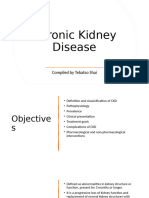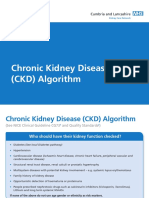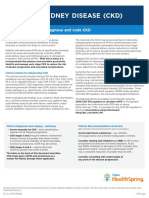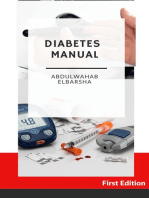0 ratings0% found this document useful (0 votes)
5 viewsCKD - Esrf
CKD - Esrf
Uploaded by
Ee Chen HengCopyright:
© All Rights Reserved
Available Formats
Download as PPTX, PDF, TXT or read online from Scribd
CKD - Esrf
CKD - Esrf
Uploaded by
Ee Chen Heng0 ratings0% found this document useful (0 votes)
5 views10 pagesOriginal Title
CKD _ ESRF
Copyright
© © All Rights Reserved
Available Formats
PPTX, PDF, TXT or read online from Scribd
Share this document
Did you find this document useful?
Is this content inappropriate?
Copyright:
© All Rights Reserved
Available Formats
Download as PPTX, PDF, TXT or read online from Scribd
Download as pptx, pdf, or txt
0 ratings0% found this document useful (0 votes)
5 views10 pagesCKD - Esrf
CKD - Esrf
Uploaded by
Ee Chen HengCopyright:
© All Rights Reserved
Available Formats
Download as PPTX, PDF, TXT or read online from Scribd
Download as pptx, pdf, or txt
You are on page 1of 10
CHRONIC KIDNEY DISEASE
• CKD refer to an irreversible deterioration in renal function
• Usually develops over period if years
Stages of chronic kidney disease
Causes
Physical signs in advanced CKD
INVESTIGATIONS
Proteinuria
• Albumin-to-creatinine ratio(ACR) - >3.0 mg/mmol is diagnostic for
chronic kidney disease, urine testing should be repeated in another 3
months
Creatine clearance/eGFR
• E.g : 56 yo male, 70 kg, serum creatinine- 150
(140-56x70/150) x 1.23 = 48.2
P.S: google gfr calculator
Ultrasound
General indications for renal ultrasound
• rapid deterioration of renal function (loss of eGFR >5 ml/min/1.73 m2
• within one year or 10 ml/min/1.73 m2 within five years)
• haematuria
• symptoms or history of urinary tract obstruction
• family history of polycystic kidney disease and age over 20 years
• when a renal biopsy is indicated
Treatment
• Blood pressure control: ACEi/ARB should be used as first-line agent in
• Diabetic kidney disease (DKD) with albuminuria
• Non-DKD when urinary protein excretion ≥1.0 g/day
• Non-DKD with hypertension when urinary protein excretion ≥0.5 g/ day
• Glycaemic Control:
• The target HbA1c should be ≤7% in diabetic kidney disease but this should be
individualized according to co-morbidities and age
• Protein Restriction:
• Low protein diet (0.6 - 0.8 g/kg/day) with adequate energy intake (30 - 35
kcal/kg/day) may be given in chronic kidney disease stage 3 – 5
• Dietary protein restriction should be supervised by a dietitian.
End Stage Renal Failure
• Irreversible kidney dysfunction
with eGFR < 15 mL/min/1.73
m2 with manifestation of
uremia requiring chronic renal
replacement therapy with
either dialysis or renal
transplantation
You might also like
- CKD CPG PresentationDocument18 pagesCKD CPG PresentationMNo ratings yet
- Chronic Kidney Disease Malaysian CPG 2011Document22 pagesChronic Kidney Disease Malaysian CPG 2011aideeh31100% (1)
- CKD - Teaching 3Document25 pagesCKD - Teaching 3Shqipe Xheladini MalokuNo ratings yet
- Gagal Ginjal Akut & Gagal Ginjal KronikDocument63 pagesGagal Ginjal Akut & Gagal Ginjal KronikSuf YusufNo ratings yet
- CKD Algorithm EBG Approved April09Document1 pageCKD Algorithm EBG Approved April09Merry Aprila RamadhaniNo ratings yet
- Investigating Kidney Function - 2025Document60 pagesInvestigating Kidney Function - 2025modupekutiNo ratings yet
- CKD 2016Document39 pagesCKD 2016husnaNo ratings yet
- Chronic Kidney Disease in ChildrenDocument29 pagesChronic Kidney Disease in ChildrenAlvin OmondiNo ratings yet
- CKDMMM 150717231019 Lva1 App6892 PDFDocument47 pagesCKDMMM 150717231019 Lva1 App6892 PDFTabada NickyNo ratings yet
- Chronic Kidney Disease (Kuliah Mhs SMT IV FK Unud 08)Document23 pagesChronic Kidney Disease (Kuliah Mhs SMT IV FK Unud 08)Arvindan Subramaniam100% (1)
- Chronic Kidney Disease: Presented By, Mariya Antony 3 Year BSC Nursing ST - Thomas College of Nursing ChethipuzhaDocument62 pagesChronic Kidney Disease: Presented By, Mariya Antony 3 Year BSC Nursing ST - Thomas College of Nursing ChethipuzhaSamuel LalNo ratings yet
- Dr. Erlieza Roosdhania, SP - PD (CKD)Document38 pagesDr. Erlieza Roosdhania, SP - PD (CKD)Pon PondNo ratings yet
- Oleh: Dr. Eko Butar-Butar Pembimbing: Dr. I Wayan Agus, SP - PDDocument36 pagesOleh: Dr. Eko Butar-Butar Pembimbing: Dr. I Wayan Agus, SP - PDEko JhonNo ratings yet
- Renal DysfunctionDocument29 pagesRenal Dysfunctionmctime35No ratings yet
- Chronic Kidney DiseaseDocument21 pagesChronic Kidney DiseaseAditya RanaNo ratings yet
- 12B. Kuliah CKD 2017Document44 pages12B. Kuliah CKD 2017yussikafernandaNo ratings yet
- CKD Pocket GuideDocument2 pagesCKD Pocket GuideLutfi MalefoNo ratings yet
- CKD CHCRTDocument28 pagesCKD CHCRTNurhidayati KeriyunNo ratings yet
- Akt RenalDocument4 pagesAkt Renaldzidek7No ratings yet
- CKD PDFDocument20 pagesCKD PDFReyhan TarisNo ratings yet
- Proteinuria and Chronic Kidney DiseaseDocument34 pagesProteinuria and Chronic Kidney DiseaseВалерий ГаврилуцаNo ratings yet
- Refer at PGK: Hesti Purwaningsih 2006730036Document19 pagesRefer at PGK: Hesti Purwaningsih 2006730036AgungKurniawanNo ratings yet
- Diagnosis Aki Dan CKDDocument39 pagesDiagnosis Aki Dan CKDEly Kartika100% (1)
- Chronic Kidney Disease: Pembimbing: Dr. Pit Lan, SPPDDocument25 pagesChronic Kidney Disease: Pembimbing: Dr. Pit Lan, SPPDAnita ZhangNo ratings yet
- Liver TransplantationDocument72 pagesLiver TransplantationManash SahaNo ratings yet
- Stages of Chronic Kidney DiseaseDocument19 pagesStages of Chronic Kidney Diseasehenath93No ratings yet
- Renal FailureDocument43 pagesRenal Failurerecofa6572No ratings yet
- In Primary Care: Chronic Kidney Disease (CKD)Document4 pagesIn Primary Care: Chronic Kidney Disease (CKD)NotForAbuseNo ratings yet
- Chronic Kidney DiseaseDocument39 pagesChronic Kidney DiseaseAgatha RogerNo ratings yet
- CKD Chronic Kidney Disease NotesDocument26 pagesCKD Chronic Kidney Disease Notestph8kskkkzNo ratings yet
- Gagal Ginjal Kronik FarmakoDocument28 pagesGagal Ginjal Kronik FarmakoIkhza Yasyifa RusydaNo ratings yet
- National Leaflet About CKD and eGFR For GPs (Updated September 2007)Document2 pagesNational Leaflet About CKD and eGFR For GPs (Updated September 2007)Dhika ArdiansyahNo ratings yet
- Cumbria and Lancs KCN Algorithm PDFDocument18 pagesCumbria and Lancs KCN Algorithm PDFratih83No ratings yet
- Anaesthesia For Liver DieseaseDocument43 pagesAnaesthesia For Liver DieseaseShehan WijayasiriwardanaNo ratings yet
- Acute Kidney Injury:: A Brief OutlineDocument48 pagesAcute Kidney Injury:: A Brief OutlinehanaNo ratings yet
- Renal MNTDocument58 pagesRenal MNTMARIA TARIQNo ratings yet
- Blood Urea Blood Creatinine Creatinine Clearance Uric Acid: Laboratory TrainingDocument44 pagesBlood Urea Blood Creatinine Creatinine Clearance Uric Acid: Laboratory Trainingعلي عبيد العتابيNo ratings yet
- Chronic Kidney DiseaseDocument18 pagesChronic Kidney DiseaseAde Cahyo IslamiNo ratings yet
- Chronic Kidney DiseaseDocument18 pagesChronic Kidney DiseaseAde Cahyo IslamiNo ratings yet
- Approach To A Patient With Acute Kidney InjuryDocument70 pagesApproach To A Patient With Acute Kidney InjuryShivamNo ratings yet
- Renal FailureDocument35 pagesRenal FailureJawad SaleemNo ratings yet
- Chronic Kidney Disease (CKD) in Children: DR Saiel Al Sarhan MD, PHDDocument48 pagesChronic Kidney Disease (CKD) in Children: DR Saiel Al Sarhan MD, PHDMAYSAA HamarnehNo ratings yet
- Gangguan Ginjal AkutDocument29 pagesGangguan Ginjal Akutb3djo_76No ratings yet
- Organ Function TestDocument45 pagesOrgan Function Testelizabathscaria5No ratings yet
- AlaaDocument7 pagesAlaaduskblade502No ratings yet
- ACR Albumin Creatinine Ratio To Be PRESENTED BY HMN TO THE NEW MED TECH TRAINEES IN JAHRA HEALTH CENTER Apr 23 2014Document22 pagesACR Albumin Creatinine Ratio To Be PRESENTED BY HMN TO THE NEW MED TECH TRAINEES IN JAHRA HEALTH CENTER Apr 23 2014honorinanuguidNo ratings yet
- Pertemuan 10 Koreksi Dosis Pada Gangguan Ginjal Dan HatiDocument60 pagesPertemuan 10 Koreksi Dosis Pada Gangguan Ginjal Dan HatiWahyu PriyantoNo ratings yet
- Chronic Kidney Disease: Wondifraw A. (MD)Document38 pagesChronic Kidney Disease: Wondifraw A. (MD)SebliNo ratings yet
- Chronic Kidney Disease (CKD) : Provider's Guide To Diagnose and Code CKDDocument2 pagesChronic Kidney Disease (CKD) : Provider's Guide To Diagnose and Code CKDAry Rio PambudiNo ratings yet
- CKD UnsoedDocument42 pagesCKD UnsoedSutan Malik IbrahimNo ratings yet
- Liver CirrhosisDocument50 pagesLiver CirrhosisMK CameraNo ratings yet
- GFRDocument28 pagesGFRStar CruiseNo ratings yet
- Renal Failure MeDocument5 pagesRenal Failure Meyoussef.aziz2020No ratings yet
- Anaesthesia in Liver Disease PatientDocument49 pagesAnaesthesia in Liver Disease PatientVG FernandezNo ratings yet
- CKD CmeDocument45 pagesCKD Cmeizatul farhanahNo ratings yet
- Farmakoterapi Sistem Endokrin: Tim Dosen Farmasi KlinikDocument42 pagesFarmakoterapi Sistem Endokrin: Tim Dosen Farmasi KlinikAnonymous h76WT2cFdkNo ratings yet
- 1.CBE CME Obstructive JaundiceDocument39 pages1.CBE CME Obstructive JaundicedeepikaNo ratings yet
- Diabetic Recipes for One and TwoFrom EverandDiabetic Recipes for One and TwoRating: 3 out of 5 stars3/5 (1)
- Diabetic Nephropathy, A Simple Guide To The Condition, Diagnosis, Treatment And Related ConditionsFrom EverandDiabetic Nephropathy, A Simple Guide To The Condition, Diagnosis, Treatment And Related ConditionsNo ratings yet



























































